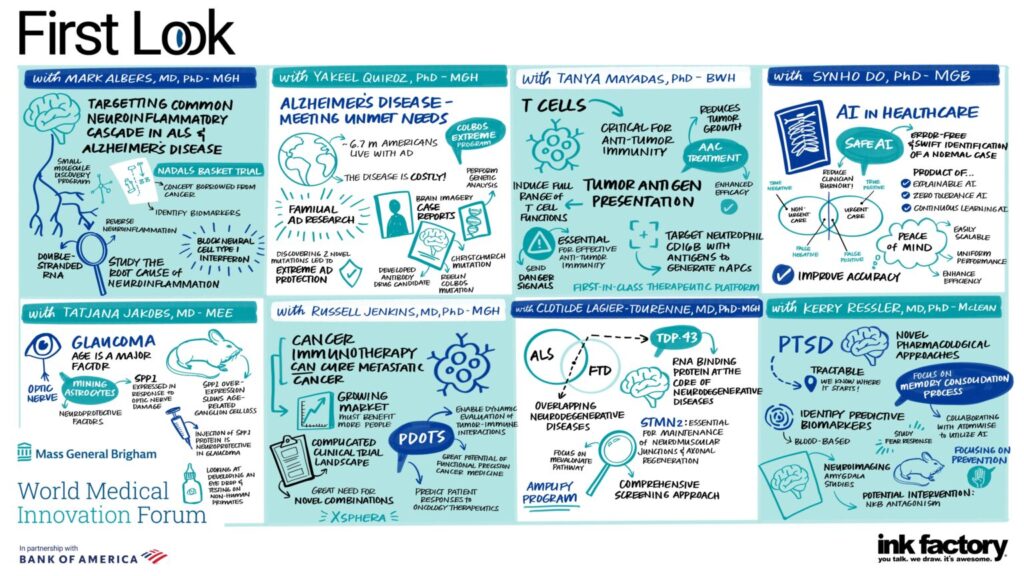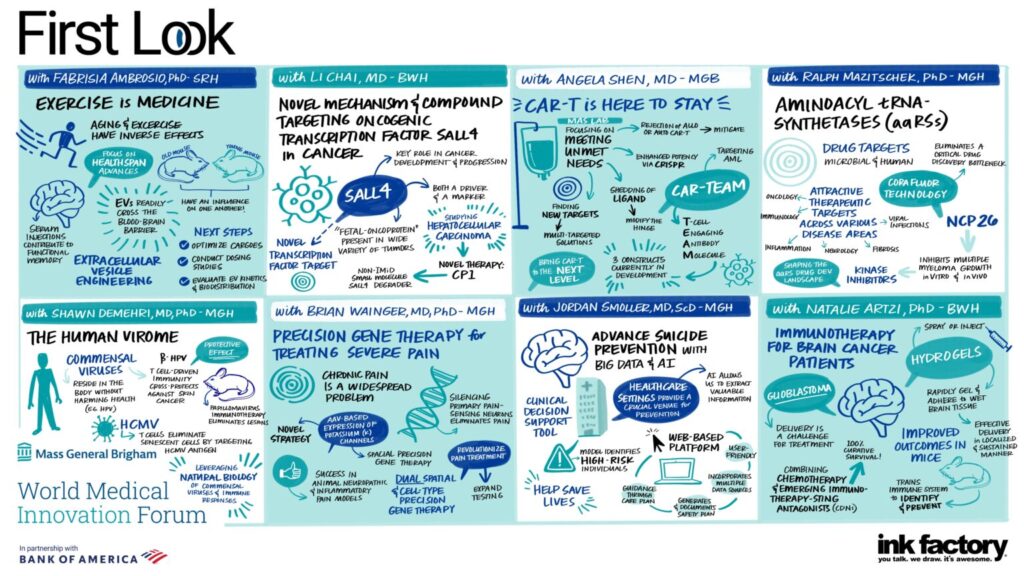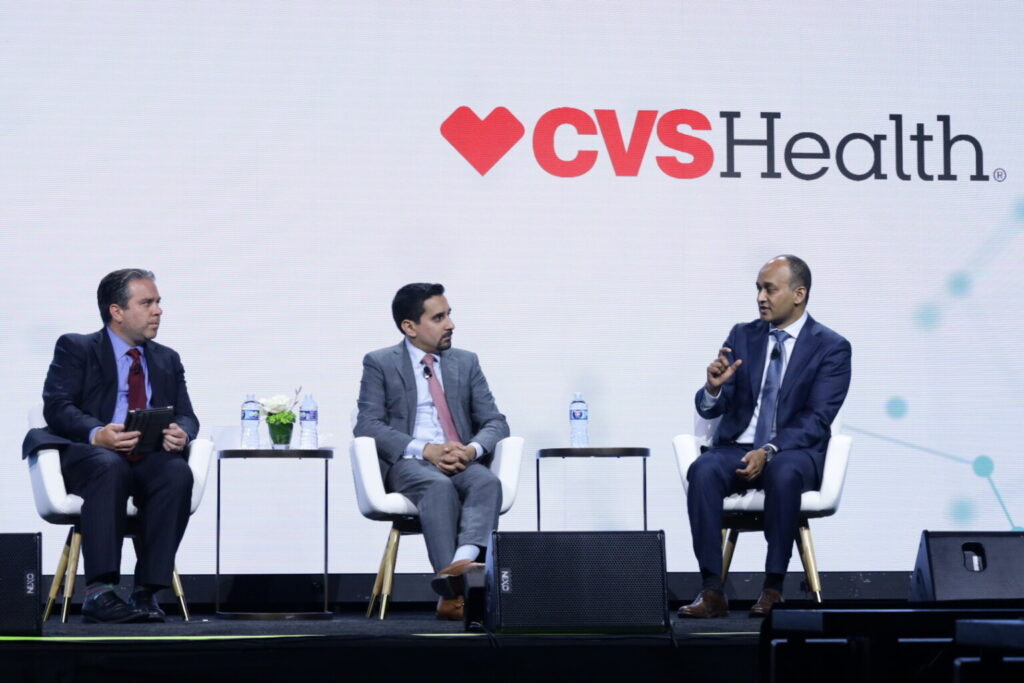WMIF MAIN SITE
2026 Event Site
First Look opened the day with the latest insights on the next wave of breakthroughs in healthcare, presented by 16 Harvard-affiliated Mass General Brigham clinicians and researchers. With topics ranging from targeting neuroinflammation in Alzheimer’s Disease and counteracting age-related cognitive decline, to the promise of immunotherapy for brain cancer and safe AI, the experts shared previews of investment-ready, high-impact technologies likely to disrupt the fields of CNS/brain health, oncology, and inflammation and immunology.
Kerry Ressler, MD, PhD, Chief Scientific Officer of McLean Hospital discussed preventing post-traumatic stress disorder and his lab’s work on novel pharmacological approaches based on the neuroscience of fear. Interventional approaches for prevention and therapy related to PTSD are limited. Because of memory consolidation that occurs after trauma experiences, timely intervention is paramount. Ressler is working on interventional approaches in the ED or in the battlefield to prevent long-term consequences of PTSD. His lab is focused on recognizing who will develop PTSD and developing novel neurobiologically derived targets for the prevention of this far-reaching condition.
Natalie Artzi, PhD, Associate Bioengineer at BWH, shared her work on a potential breakthrough for glioblastoma, a particularly difficult-to-treat brain cancer in which 90 percent of patients will not be alive 24 months after diagnosis. Local delivery of therapeutics is on the horizon with new hydrogels that can be injected or sprayed directly into the tumor, thus bridging the challenge of penetrating the blood-brain barrier.
Watch all of the First Look sessions.


A lively, standing room only, discussion on generative AI — large language models that encompass text, image, audio, video and code to generate content – was part of The Doctor Is In sessions featuring experts from Mass General Brigham and other leading organizations. Moderated by Adam Landman, MD, Chief Information Officer and Senior Vice President of Digital at Mass General Brigham, panelists offered insights on the promises and perils of this cutting-edge technology’s impact on healthcare. The ‘promise’ included AI’s ability to reduce administrative burdens on clinical staff in order to focus more directly on patient care. The ‘perils’ include potential biases in model development, especially as they relate to equity of care. The need for establishing best practices and risk management in AI’s rise into healthcare were discussed to assure transparency and dataset validation.
Watch The Dr. Is In | Generative AI, ChatGPT, and the Rapidly Changing Role of AI in Healthcare
Four speakers talked about advancing therapies based on immune system activation. Citing how immune checkpoint inhibitor medications to treat cancer can trigger autoimmune disease in about 50 percent of patients, Chief of Oncodermatology at BHW and Vice Chair of Dermatology at Dana-Farber Brigham Cancer Center, Nicole LeBoeuf, MD, discussed how checkpoint inhibitors, which take T-cells and remove their blocking pathways to allow them to fight cancer, sometimes affect organs and can cause immune related adverse events across the body. With 11 FDA-approved immune checkpoint inhibitors now available, all capable of causing secondary health issues as they treat cancers, “We are past the time of when medical oncologists should be able to handle the side effects across the spectrum,” said LeBoeuf. “It is like asking a primary care physician to handle everything and to never refer to a specialist,” she explained. “Understanding how we can uncouple toxicity from therapeutic effect is critical.”
The plenary session opened with a lively discussion of how healthcare and innovation are advancing at a breakneck pace and how Boston is at the center of that change. Speakers agreed that a key ingredient is sustaining that growth so that more patients can benefit from such research. In opening remarks, Anne Klibanski, MD, CEO of Mass General Brigham and Brian Moynihan, CEO of Bank of America spoke with moderator Jonathan Kraft, President of The Kraft Group, and Chairman, Board of Trustees at Massachusetts General Hospital, about this inviting future.
Klibanski cited the region’s “incredible ecosystem of pharmaceutical companies, healthcare startups, venture capital firms, banks and top universities in the country” that make healthcare innovation happen. She noted that, “research promises the ability to impact patients at scale…the ingredients are here and that is what you need to move it forward. We have it all in Boston, but scaling it up around the country, that’s the challenge,” she said.
Kraft noted that a number of Forum attendees represent smaller companies that are early clinical or preclinical stages, who may not be at the right point to approach a commercial bank like Bank of America for insights. Moynihan explained that it’s helpful for such companies to visualize being a sizeable company with sizeable structure, and work backwards from there. “Bank of America is here as an advisor, and we can provide guidance on ‘here’s where we see the industry going, how we can attract capital,” Moynihan said. “We help companies here understand that.”
Both Klibanski and Moynihan said working together in Boston, and Massachusetts, is ideal.
Maura Healey, Governor of the Commonwealth of Massachusetts, thanked Forum attendees for their work in finding new ways to treat and eliminate disease and improve healthcare and health outcomes. She also praised the Bay State as an environment where such efforts can thrive.
In Massachusetts, “we celebrate and support our innovators,” she said. “We teach. We discover. We invest. We welcome and embrace all of humanity… this is our culture, and it cuts across all civic life.”
As the first woman and openly LGBTQ person elected governor in the Bay State, Healey cited some of Massachusetts’ firsts, including pioneering universal healthcare for all and legalizing gay marriage. Other firsts included the first public library, heart valve surgery, anesthesia, and MRI technology.
“Here’s why it matters right now: too many other places are erecting barriers to progress, and some are trying to take us backwards,” Healey said. We are a state with a value proposition of investing. We are a state that will always support data, brains, and talent, with a demonstrated capacity to work together. We are so much better and powerful when we able to harness that.”
Healey cited MassTalent, a new program which will help to develop a pipeline of skilled workers for the state’s life sciences and other employers. “We want to see you cure even more diseases, and help more patients,” she said. “We want to help you grow your workforce. Thank you for your energy and your investment. We are ready to invest and to move forward.”
Watch Opening Remarks
Watch Governor Maura Healey Welcome
Chris Viehbacher, Biogen’s CEO, spoke about the cost of drugs and the changing healthcare landscape with Meg Tirrell, CNN’s medical correspondent in a 1:1 Fireside Chat. Viehbacher, who spent 20 years with GlaxoSmithKline and was global CEO of Sanofi, said he has seen how drug prices have changed through the years. “One of the things in healthcare, unlike any other area or industry, you see the impact of what you do with patients,” he said. “The social contract and the impact of what we do keeps us motivated.”
Viehbacher spoke about Biogen’s potential treatment for patients with Alzheimer’s Disease, lecanemab, which received accelerated approval in January 2023. Last week, an FDA advisory committee voted unanimously in favor of traditional approval. “The level of risk investment” to bring a successful drug to market is difficult, he said. “Pricing is so difficult for the industry, and yet, pricing seems really high. It goes into the tens of billions going into medicine development, and so many fail. You really see the heartbreak of companies who put so much into it and fail. Really, every now and then, we see something succeed. Let’s not forget the ten drugs along the way that failed.”
Viehbacher also noted that drug prices may eventually go down once medications go off patent. “It’s hard to do innovation and have really low-cost drugs,” he said. “I remember when people complained about the cost of Lipitor, and they don’t complain about it anymore. Now, you can get a 30-day amount for $4. You need a patent-protected period, and that applies to ten percent, but about 90 percent of drugs are not.
Tirrell asked whether Biogen might move into the latest popular category of medications, the GLP-1 obesity medications. Viehbacher didn’t think so.
“Biogen prides itself on going after the hard problems that others don’t go after,” he said. “I went to Biogen because it is really interested in innovation. I think going after things that no one else is going after is a good way to go.”
Watch 1:1 Fireside Chat – Meg Tirrell, Chris Viehbacher
David Brown, MD, President of Mass General Hospital and Kate Walsh, Secretary of Health and Human Services for the Commonwealth of Massachusetts, discussed opportunities to bring innovation and creativity to those who need it most and meeting the unmet health needs of Massachusetts residents. In this role, where she has served for 100 days, as well as her previous experience leading Boston Medical Center, she shared insights on where the gaps in care are, and what more needs to be done to help patients in the evolving landscape of healthcare. In particular, she pointed to the tsunami that is approaching among the aging population, most notably from neurodegenerative diseases, as well as the challenges faced by the neuro-divergent population and an adolescent mental health crisis. New ways of thinking, including revamping staffing requirements for certain social services roles, may be key in helping more patients and assuring care equity.
Watch 1:1 Fireside Chat – David Brown, Kate Walsh
Wrapping up the day, Sree Chaguturu, MD, Senior Vice President and Chief Medical Officer of CVS Health, discussed trends in consumer healthcare including primary care, retail health, and the home. Chaguturu was joined by Michael Cherny, Managing Director, Senior Equity Research Analyst of BofA Securities and Niyum Gandhi the Chief Financial Officer of Mass General Brigham.
Watch Fireside Chat – Michael Cherny, Niyum Gandhi, Sree Chaguturu
